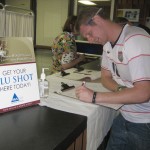By Chris Agar & Kimberly Manahan

Tanner Polce, a freshman, signs up for his annual flu shot at the Student Activities desk during the vaccination clinic held on Oct. 5.
There have not been any cases of H1N1 (commonly known as swine flu) on campus, but Wesley officials say they are taking every precaution to ensure that an epidemic of seasonal flu does not happen.
“We are working with the department of public health and students and their parents will be receiving a letter about our protocol with H1N1,†said Mary-Alice Ozechoski, the dean of students. “We are following all the CDC (Center for Disease Control) guidelines.â€
If a student catches swine flu, she said, the student will either be sent home or spend a week in isolated confinement.
According to the CDC statement available online, after seven days, the symptoms and ability to pass the disease go away. If a student was to spend a week in isolated confinement on campus, Aramark Food Services will deliver meals to the student. A Pandemic Committee will respond to the student’s individual needs. The school is currently working on obtaining the H1N1 vaccine to distribute to students.
The college also offered a seasonal flu vaccine to students on Oct. 5.
The vaccine cost students $30.
“We work for an agency called Maxim Health Systems,†said Francis Pitts, a Wesley Graduate and RN who was working at the clinic.
As of noon, at least 20 students and a lot of staff came to get their shots, Pitts said.
Senior Christina White got the flu shot because she doesn’t want to get the flu.
Students said a good reason for getting the shot is because they live in such close quarters in the dorms.
“Every student should consider getting a flu shot,†White said.
“You don’t want to miss school,†Pitts said.
Symptoms of H1N1 include high fever, body aches, upper respiratory symptoms, cough and sore throat, said Paul Celli, a medical technologist at Baltimore-Washington Medical Center.
To better avoid H1N1, Maser advises people to avoid close contact with sick people, wash their hands, and cover your mouth when sneezing or coughing, and practice good health habits, such as sleeping well and exercising.
“Avoid touching your eyes, nose, and mouth,†Maser said. “Germs are often spread when a person touches something that is contaminated with germs and then touches his or her eyes, nose or mouth.â€
Wesley also has installed hand sanitizer dispensers in the buildings throughout campus.
For additional information on H1N1, you can visit the Centers for Disease Control web site, www.cdc.gov.
Quick Facts
Symptoms of influenza:
- fever
- cough
- sore throat
- headache
- chills
- muscle aches
- fatigue
Who should get the vaccine:
- all children from 6 months through 18 years of age
- anyone over the age of 50
- anyone with long term health problems
- women you are pregnant or plan on being pregnant during influenza season
- anyone with a weakened immune system
- anyone with muscle or nervce disorders
- nursing home residents
Source: (from Dept. of Health and Human Services)





